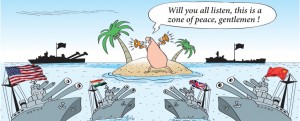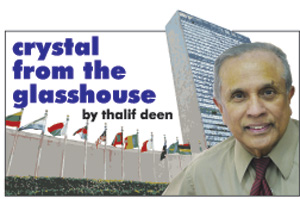Sunday Times 2
How Sri Lankan diplomacy was undermined by big power politics
View(s):UNITED NATIONS – Addressing a fistful of academics and students at Yale University many moons ago, a former Indian ambassador said one of the biggest misconceptions about Asia, among most Americans, is that the Indian Ocean belongs to India. Not true, he said amidst laughter.
 And that’s not surprising considering that the average American has little or no knowledge of international politics — or even remotely aware of the difference between Sri Lanka and Sierra Leone or between Colombo and Colombia. The usual reaction is: “What the hell. They all sound the same.”
And that’s not surprising considering that the average American has little or no knowledge of international politics — or even remotely aware of the difference between Sri Lanka and Sierra Leone or between Colombo and Colombia. The usual reaction is: “What the hell. They all sound the same.”
But what about US leaders and politicians?
During the Iran-Iraq Gulf War in 1980-1988 and the US-led air attacks to oust Iraqi forces from occupied Kuwait in 1991 (and not forgetting the US invasion of Iraq in 2003), US politicians continued to mis-pronounce Iraq and Iran.
For most of them, Iraq was I-raq and Iran was I-ran, prompting one comedian to say: “The US should stop invading countries until our leaders know how to pronounce the names of the countries we invade.” Right on target!
 But I digress. Speaking of the Indian Ocean, the UN General Assembly created an Ad Hoc Committee (and that’s UN jargon for most committees) in December 1972 to ensure the implementation of a Sri Lankan proposal initiated by Prime Minister Sirimavo Bandaranaike, to declare the Indian Ocean a Zone of Peace (IOPZ), following a resolution adopted in 1971.
But I digress. Speaking of the Indian Ocean, the UN General Assembly created an Ad Hoc Committee (and that’s UN jargon for most committees) in December 1972 to ensure the implementation of a Sri Lankan proposal initiated by Prime Minister Sirimavo Bandaranaike, to declare the Indian Ocean a Zone of Peace (IOPZ), following a resolution adopted in 1971.
The resolution called upon the big powers to enter into immediate consultations with the littoral States of the Indian Ocean with a view to halting the further escalation and expansion of their military presence in the Indian Ocean.
Sri Lanka has chaired that Committee through succeeding Ambassadors for 44 long years. But the results have been zilch. As someone who chaired that Committee, Ambassador H.M.G.S. Palihakkara, who recently quit the post of Governor, Northern Province, to “resume” his glorious retirement, says the whole notion of a peace zone in the Indian Ocean was “brain dead,” largely because of big power politics.
Ambassador Charlie Mahendran (“they call me Charlie because they cannot pronounce Chittambaranathan — clearly a case of non-pronunciation, not mispronunciation) says the resolution was dead on water, probably in the depths of the Indian Ocean itself.
The proposal eventually became such a running gag that prompted one of the Sri Lankan diplomats (long rumoured to be pun-loving Ambassador Nihal Rodrigo, known for his “Nihalisms”, not nihilism) who jokingly dubbed a leaking toilet in the precincts of the Foreign Ministry as “the Indian Ocean Zone of Piss.”
But the failure of the proposal was certainly not for the lack of negotiating skills of our diplomats but was due to one of the biggest shortcomings in the UN system where all decisions by the major powers are governed and dictated to by their own national interests — be it the Americans, the Brits, the French, the Russians or the Chinese, all veto-wielding permanent members of the Security Council.
As Jayantha Dhanapala, one of our outstanding diplomats who eventually ended up as UN Under-Secretary-General for Disarmament Affairs, points out the Sri Lanka brand of diplomacy “had a universal appeal because of its moderation, its competence, language skills and general acceptance.”
The call for a zone of peace in the Indian Ocean came during the height of the Cold War. The Americans, the French and the Brits were unwilling to abandon their military bases in the Indian Ocean, including Diego Garcia. The lease of the island by UK to the US was justified on the grounds that Diego Garcia was unpopulated, when in fact the people on the island were forcibly relocated to a neighbouring country whose leaders were duly compensated.
The first sign of trouble came when the Western powers abstained in the voting on the IOPZ resolution and then absented themselves from the proceedings of the Ad Hoc Committee with the result that we were preaching to the already converted, mostly countries in the Indian Ocean region.
Ironically, the moment has come for IOPZ to be revived in the context of China, India and the US vying for influence in the Asia-Pacific region. But the question is will the proposal fly — particularly if it is torpedoed by the big powers?
Perhaps the same holds true with the UN Special Committee on Israeli Practices (more appropriately Israeli Mal-practices?) which has existed for 48 years since its creation in December 1968. The Committee, chaired by successive Sri Lankan ambassadors, has not been granted permission or visas to enter Israeli-occupied territories, except on a single occasion.
As a result, all of the meetings to investigate Israeli human rights violations have been held far away from the scene of the crimes – mostly in neighbouring Jordan, Egypt and Syria. The US and Western powers, which support Israel, right or wrong, have virtually gone along with the Israeli stance making a mockery of the UN Special Committee.
A third Committee we chair — the UN Ad Hoc Committee to Eliminate Terrorism — has long been deadlocked over the definition of “terrorism”. But the ultimate definition of terrorism has continued to defy governments, rights groups, the media and even the United Nations.
The United States and Israel continue to label “Hamas” a terrorist organisation but much of the mainstream media calls it “a militant organisation.” The European Court of Justice has upheld an appeal by Hamas, pointing out that its designation as a “terrorist” group by the European Union (EU) was “based not on acts examined and confirmed in decisions of competent authorities but on factual imputations derived from the press and the Internet.”
Since 2000, the Ad Hoc Committee has failed to adopt the last of its conventions against terrorism: the Comprehensive Convention on International Terrorism (CCIT) sponsored by India.
Still, Ambassador Rohan Perera, chairman of the Ad Hoc Committee and currently Sri Lanka’s Permanent Representative to the United Nations, says the work of his committee has resulted in the adoption of three counter terrorism conventions, namely, the International Convention for the Suppression of Terrorist Bombings, the International Convention for the Suppression of the Financing of Terrorism and the International Convention for the Suppression of Acts of Nuclear Terrorism.
But as his Canadian predecessor said when he handed over the chairmanship of the Committee, Rohan will remain chairman for life — because the UN will never agree on a definition of terrorism.
(The writer can be contacted at thalifdeen@aol.com)

